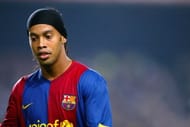
Trailing 1-0 to Arsenal at the Stade de France – so close to the Parc des Princes where he plied his trade with PSG – Ronaldinho was a part of that team that announced the return of Barcelona to the world’s stage when the Spanish side turned it around with late goals from Juliano Belletti and Samuel Eto’o.
That, however, was to be the beginning of the end for Rijkaard. No major honours arrived at the Camp Nou over the next two years and the 8th of May 2008 will always be remembered as the day on which the man who won Barcelona their second European crown was sacked.
But as one chapter of Azulgrana history ended, another one was to begin.
Pep Guardiola succeeded Rijkaard at Barcelona and he wanted to instil in his newly-inherited side a sense of collectivism. This to him meant no Ronaldinho.
The South American, in Guardiola’s book, was too self-centred. Too individualistic, too selfish on the ball. He was a man who would prefer having a pop at goal after an excellent dribble rather than lay it off to someone else. There was no place for him, therefore, in this new-look Barcelona outfit.
But Guardiola’s Barcelona have been criticised in the past for not having an alternative to picking their way past the proverbial bus that teams park in their way. Lionel Messi‘s standard of play is so high that he will unlock defences time and time again because it is that style of football that he has employed since he was a boy. His first interaction with a football was when he was four years old and he has been playing that way ever since.
But imagine the potency of a a Messi-Ronaldinho partnership. Surely, they could have used his services against Inter Milan, when Jose Mourinho decided to stop Barcelona by asking his team to clear the ball for 90 minutes. He would have definitely been extremely handy when Messi was out of sorts and they needed someone to rescue them against Bayern Munich. And what of Barcelona’s exit from the King’s Cup at the hands of Real Madrid at the Camp Nou? He would have unlocked the capital side’s defences time and time again if given the opportunity to do so.
Because that was essentially the sort of player Ronaldinho was. His football was infused with jogo bonito. With such joie de vivre did he play his game that the vision he showed to pierce the opposition came to him naturally. The tricks and flicks he employed were not learnt over time. They came to him instinctively and with such spontaneity that you could not help but be wowed and look on with a very bemused expression every time he reached into his bag of magic tricks and left the world amazed.
“Ronaldinho is technically very good, but also very strong physically. He was against three players and I could not stop him. After that goal everything ended for us”.
- John Terry, defender, Chelsea FC
Such effortless artistry did he show at Barcelona, the type of artistry that no one can possibly replicate. His excellent performance against Real Madrid in 2005 saw the Bernabeu faithful selflessly give their hated rival a standing ovation; that goal against Chelsea which left both John Terry and Petr Cech rooted to the spot; his immaculate bicycle kick against Villarreal which he had dreamt of scoring since he was a boy. All wonderful memories that added to his image as a global icon.
It was clear that he was happiest at Barcelona. A slew of personal awards came his way when he was at the Camp Nou. Two consecutive FIFA World Player of the Year awards came in 2004 and 2005. A Ballon D’Or and FIFPro World Player of the Year Award accompanied the latter. He was included in three UEFA and FIFPro Teams of the Year and was also named the UEFA Club Footballer of the Year for 2005-06.
He never managed to scale the heady heights he did in Catalonia anywhere else. While he did win an Italian league title with Milan, he just never showed the same enthusiasm he did at Barcelona, until he returned to his homeland with Flamenco and later Atletico Mineiro.
“I think each player has an individual style. Each is concerned with giving the best to his team, and I think my best talent is dribbling and setting up goal situations, giving an assist or deceiving one of the other team’s players”.
- Ronaldinho
‘Dinho’ is an artist, and the pitch his canvas. Unfortunately for him, his masterpieces were not what were needed by those who owned the studio. He is football’s answer to Leonardo Da Vinci and Vincent van Gogh. It was just sad that his particular skill set was unappreciated by those who made the decisions that mattered.
Now 33, the sun is bound to set on the career of one of the world’s greatest modern day footballers who was torn away from a club he loved so much because he was considered too individualistic. Because he hogged the ball and would not give it to anybody else. But truth be told, that individualism never left Barcelona. It just changed feet. It found the man who replaced Ronaldinho as Barcelona’s star, which meant that the Guardiola model of collectivism would continue to be flawed.
It found Lionel Messi.
